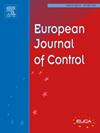Bilayer nonzero-sum differential game-based optimal control of modular robot manipulator for human–robot collaboration
IF 2.6
3区 计算机科学
Q2 AUTOMATION & CONTROL SYSTEMS
引用次数: 0
Abstract
This paper introduces a bilayer nonzero-sum differential game-based optimal control framework for a Modular Robot Manipulator (MRM) in Human–Robot Collaboration (HRC) tasks. The dynamic model of the MRM is obtained with the Joint Torque Feedback (JTF) technique. Consider the -player nonzero-sum differential game within the MRM subsystems and the 2-player nonzero-sum differential game involving both the MRM and human collaborators in HRC tasks as the inner and outer layers of the bilayer nonzero-sum differential game. The Nash equilibrium solutions for the inner and outer layers of the nonzero-sum differential games are independently determined using the Adaptive Dynamic Programming (ADP) algorithm, which is based on a fuzzy logic system. As a result, optimal control policies for MRM subsystems and the optimal interaction force in HRC tasks are derived. The trajectory tracking error of the MRM system and the outer layer physical Human–Robot Interaction (pHRI) system have both been proven to be Ultimately Uniformly Bounded (UUB) under the bilayer nonzero-sum differential game-based optimal control of MRM for HRC with the application of Lyapunov theory. Finally, experiment results are presented to validate the superiority and effectiveness of the proposed method.
基于双层非零和微分对策的模块化机械臂人机协作最优控制
本文介绍了一种基于双层非零和微分对策的人机协作任务模块化机器人(MRM)最优控制框架。采用关节转矩反馈(JTF)技术建立了磁流变机的动力学模型。考虑MRM子系统中的n人非零和微分博弈和HRC任务中涉及MRM和人类合作者的2人非零和微分博弈,作为双层非零和微分博弈的内层和外层。采用基于模糊逻辑系统的自适应动态规划(ADP)算法,独立确定非零和微分对策的内层和外层纳什均衡解。在此基础上,推导出了MRM子系统的最优控制策略和HRC任务中的最优交互力。应用李亚普诺夫理论,在基于非零和微分博弈的HRC MRM最优控制下,证明了MRM系统和外层物理人机交互(pHRI)系统的轨迹跟踪误差最终一致有界。最后给出了实验结果,验证了该方法的优越性和有效性。
本文章由计算机程序翻译,如有差异,请以英文原文为准。
求助全文
约1分钟内获得全文
求助全文
来源期刊

European Journal of Control
工程技术-自动化与控制系统
CiteScore
5.80
自引率
5.90%
发文量
131
审稿时长
1 months
期刊介绍:
The European Control Association (EUCA) has among its objectives to promote the development of the discipline. Apart from the European Control Conferences, the European Journal of Control is the Association''s main channel for the dissemination of important contributions in the field.
The aim of the Journal is to publish high quality papers on the theory and practice of control and systems engineering.
The scope of the Journal will be wide and cover all aspects of the discipline including methodologies, techniques and applications.
Research in control and systems engineering is necessary to develop new concepts and tools which enhance our understanding and improve our ability to design and implement high performance control systems. Submitted papers should stress the practical motivations and relevance of their results.
The design and implementation of a successful control system requires the use of a range of techniques:
Modelling
Robustness Analysis
Identification
Optimization
Control Law Design
Numerical analysis
Fault Detection, and so on.
 求助内容:
求助内容: 应助结果提醒方式:
应助结果提醒方式:


